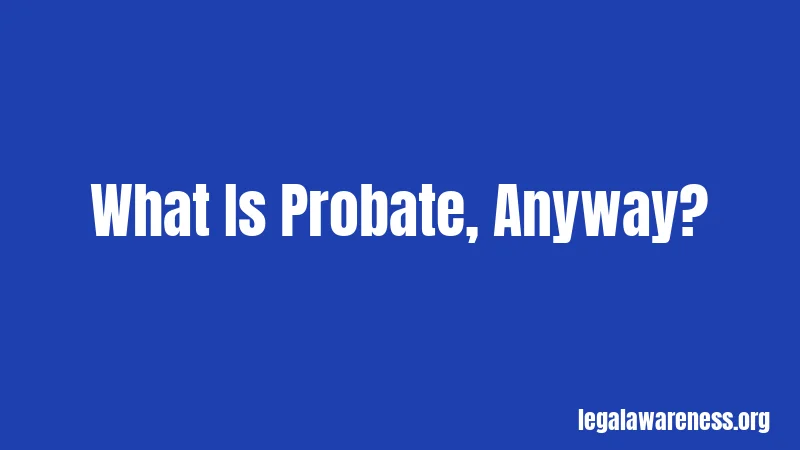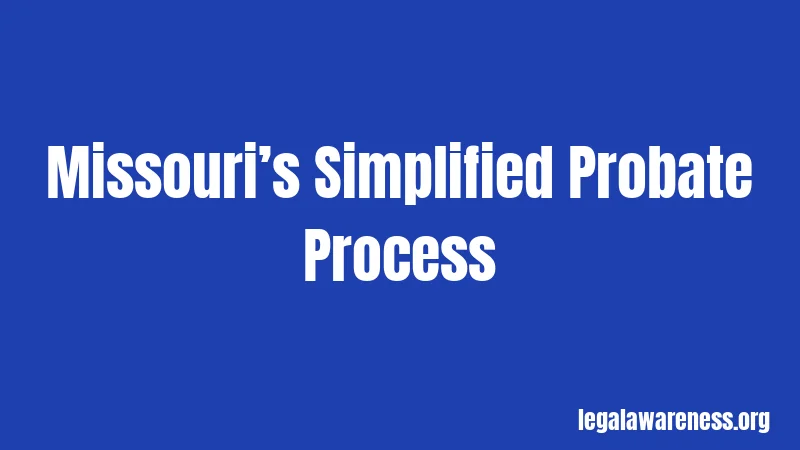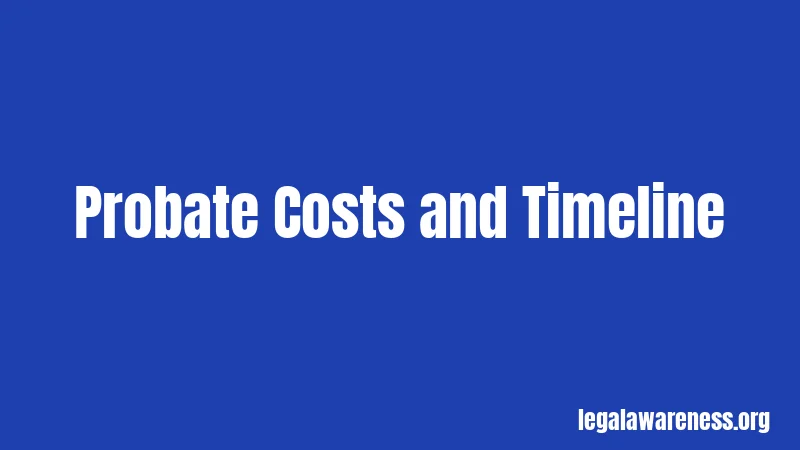Missouri Probate Laws in 2026: What Happens to Your Stuff After You’re Gone
Most people never think about probate until it’s too late. Seriously. But here’s the thing: Missouri has some pretty specific rules about what happens to your stuff when you pass away. Whether you have a will or not, the state has a process in place. And honestly, knowing the basics now can save your family a lot of headaches later.
Let’s be real. Probate can seem complicated. But it’s actually pretty straightforward once you break it down. Think of it like this: your stuff doesn’t just disappear. Missouri has a system to make sure it goes where it’s supposed to go.
What Is Probate, Anyway?

Okay, let’s start simple. Probate is the legal process Missouri uses to handle your stuff after you die. This includes your house, your car, your bank account, your jewelry. Basically anything you own.
When you pass away, the state needs to make sure your property gets to the right people. That’s probate. It’s a court-supervised process that makes sure everything is done fairly and legally. Right? Pretty straightforward.
Not everyone’s stuff goes through probate, though. We’ll get to that in a second.
Basic Missouri Probate Laws
What Property Goes Through Probate?
Here’s where it gets interesting. Not all your property needs to go through probate. Some stuff bypasses the whole process.
Property that goes through probate includes your house, your car, and money in bank accounts under just your name. Basically, anything you own individually. If you have a will, it tells the court where this stuff should go. If you don’t have a will, Missouri’s intestate laws (that’s what we call it when there’s no will) decide who gets what.
But hold on. Some things automatically skip probate entirely. Property in a living trust? That goes directly to whoever you named. Money in a payable-on-death bank account? Same thing. Life insurance proceeds? Those go to your beneficiary, not through probate. It’s actually pretty smart. You’re not alone if this confuses you. Most people don’t realize which of their belongings avoid probate.
What Property Skips Probate?
Let me break this down. You could name a beneficiary on certain accounts and they get the money immediately when you pass. No probate needed. Joint property with someone else also skips probate. If you own your house with your spouse as “joint tenants with rights of survivorship,” your spouse gets it automatically. Super simple.
Life insurance, retirement accounts like 401(k)s and IRAs, and funeral trust accounts all bypass probate too. The key is that you name a beneficiary. That person gets the money directly. Your will doesn’t control any of this.
This is actually the part most people miss. You can plan your estate so that most of your stuff never touches probate. Pretty cool, right?
Who Can Be the Executor?
The executor is basically the person who runs your estate. They handle all the paperwork, pay any debts, and make sure your stuff gets to the right people. Honestly, this is one of the most important jobs in your will.
You can pick anyone you trust. Your spouse, an adult child, a friend, even a professional executor like a bank or attorney. But wait, there are some rules. The person has to be at least 18 years old. They can’t have major criminal convictions. And in Missouri, executors need to be honest and responsible, since they’re handling other people’s money.
Stay with me here. The executor also has to file paperwork with the probate court. They need to get the will verified as legit. They have to tell everyone who should know about the probate process. And they need to inventory everything in the estate.
Missouri’s Simplified Probate Process

The Affidavit Process: Faster Than You’d Think
Okay, here’s where things get really interesting. Missouri has something called an “affidavit” process for smaller estates. This is basically a shortcut.
If your estate is small enough, it doesn’t need to go through full probate. Instead, the family can file a simple affidavit (that’s just a fancy word for a sworn statement) with the probate court. This can be done way faster. Way cheaper too.
What counts as a “small estate”? In Missouri, if your total property is under $40,000, you might qualify. But here’s the catch: not all property counts. Your house doesn’t count, for example. Only personal property like bank accounts and cars count toward that $40,000 limit. Confused about the difference? Let me break it down. Real estate is land and buildings. Personal property is everything else.
The affidavit process is honestly pretty amazing. It’s supposed to be simple enough that regular people can do it without a lawyer. That said, lots of people still hire attorneys because it’s such an important process.
Full Probate: When the Affidavit Won’t Work
If your estate is bigger than $40,000, or you have real estate, you’re looking at full probate. Don’t worry though. It’s not as scary as it sounds.
Full probate means the case goes through the probate court. A judge oversees everything. The executor has to file tons of paperwork. They need to list all the property in the estate. They have to notify all heirs and anyone else who should know. The court publishes a notice in the newspaper (yep, still happens).
Here’s the important part: creditors get a chance to make claims. If you owe money, creditors can come forward during probate. The executor has to pay those debts before anyone gets money from the estate. That’s actually why probate exists. It protects people from getting sued later because the estate didn’t pay what it owed.
The whole process usually takes four months to a year. Sometimes longer if things get complicated.
Missouri’s Intestate Laws: What Happens Without a Will?
If You Die Without a Will
Hold on, this part is important. If you don’t have a will, Missouri has laws that decide who gets your stuff. These are called intestate succession laws. The state basically becomes your backup plan.
Here’s how it works. If you’re married with no kids, your spouse gets everything. If you’re married with kids, your spouse gets half and your kids split the other half. If you have kids but no spouse, your kids inherit everything equally. If you have no spouse and no kids, your parents get everything. If your parents are gone, it goes to your siblings.
It’s actually pretty logical. The state assumes you’d want close family to get your stuff. But honestly, most people would want to make their own decisions. That’s why having a will matters.
The problem with dying without a will is that your family can’t control what happens. The state decides. You might want a certain person to get your jewelry, but without a will, that’s not possible. A friend might need help, but without a will, they get nothing.
Spousal Rights in Missouri
If you’re married, Missouri has some special rules that protect your spouse. These are called spousal elective share rights. Basically, your spouse has the right to a portion of your estate no matter what your will says.
This means you can’t completely cut out your spouse, even if you tried. Missouri law won’t allow it. Your spouse gets at least a certain percentage. This is meant to protect spouses from being left with nothing.
The exact amount depends on whether you have kids. If you have no kids, your spouse gets 50 percent. If you have kids, your spouse gets one-third. These rules are pretty strict, honestly. The state takes protecting spouses seriously.
Probate Costs and Timeline

How Much Does This All Cost?
Okay, let’s talk money. Probate isn’t free. There are court filing fees, attorney fees, and various other costs.
Court filing fees in Missouri vary by county but usually run a few hundred dollars. Attorney fees depend on how complicated things are. Some attorneys charge hourly rates. Others charge a percentage of the estate value. You might pay anywhere from $1,000 to $5,000 for a straightforward estate. More complicated estates cost way more.
There are also costs like getting property appraised, filing taxes, publishing notices in newspapers. All this adds up. Pretty straightforward why people want to avoid probate, right?
But here’s the good news. Remember that affidavit process? Way cheaper. Sometimes just a few hundred dollars total. This is one reason why planning ahead matters.
How Long Does Probate Take?
Most straightforward probate cases take about six months to a year. Some take longer.
The minimum timeline in Missouri is roughly four months. That’s how long the state requires you to wait for creditors to come forward. After that, you can move forward. But if there are complications, delays happen. Disputes over the will, complicated finances, missing heirs. Any of these can drag things out.
The simplified affidavit process is way faster. You might be done in a few months. Sometimes just weeks if everything is straightforward.
How to Create a Will in Missouri
What You Need to Know
Creating a will in Missouri is actually pretty simple. But there are rules you have to follow or the court won’t accept it.
First, you have to be at least 18 years old. You have to be mentally competent (meaning you understand what you’re doing). And you have to sign the will in front of two witnesses. Those witnesses have to see you sign it. They have to understand that you’re making a will.
The will has to be in writing. It can be handwritten or typed. But it absolutely has to be signed by you and witnessed. This is super important. Without witnesses, Missouri probably won’t accept it as valid.
Self-Made Wills vs. Attorney-Drafted Wills
You can write your own will. Lots of people do. You can buy forms online. You can use template software. They usually work fine for simple situations.
But here’s the thing. DIY wills sometimes have problems. You might miss something important. You might not follow all of Missouri’s rules exactly right. Then when you die, your family could end up fighting in court.
An attorney costs money. Maybe a few hundred dollars for a simple will. But they know all the rules. They’ll ask important questions you might not think of. They can help you plan to avoid probate if that’s what you want.
Honestly, a lawyer is worth it if your situation is complicated at all.
Special Circumstances in Missouri
What About Blended Families?
If you have kids from different relationships, probate gets trickier. Missouri law says all your kids inherit, whether they share both parents with you or not.
This can create problems. Your current spouse might expect certain things. Your kids from a previous marriage have rights too. Without a clear will, family conflict happens a lot.
The solution? Make a will that spells everything out. Tell the court exactly what each person should get. Name a trusted executor who understands the family situation.
What if Someone Contests the Will?
Sometimes people disagree with what the will says. An unhappy family member might claim the will isn’t valid. Maybe they say you weren’t mentally fit when you wrote it. Maybe they say someone tricked you.
In Missouri, these disputes go through the probate court. A judge decides. The process can get expensive and take a lot of time.
This is why having a properly witnessed, clearly written will helps. It makes it harder for someone to successfully challenge it. And naming a good executor who can explain your thinking matters too.
Does Missouri Have an Inheritance Tax?
Good news here. Missouri does not have an inheritance tax. Your heirs don’t owe the state money just because they inherited something.
But wait. They might owe federal taxes if the estate is really large. Estates over a certain amount owe federal estate tax. In 2026, that threshold is pretty high. But super wealthy families need to think about this.
Also, some inherited things produce income. If you inherit rental property, the income from rent is taxable. Your heirs need to know this.
How to Avoid Probate in Missouri
Living Trusts: The Popular Choice
A living trust is basically a legal document that says you control property while you’re alive, but someone else takes over after you die.
Here’s how it works. You create a trust. You transfer your property into the trust’s name. You name a successor trustee (that’s who takes over when you pass). When you die, that person controls the property according to the trust document. Everything happens outside of court. No probate needed.
The big advantage? Way faster. Way cheaper. Your family’s business stays private, not public court records. And if you become unable to manage your own affairs while you’re alive, the successor trustee can take over immediately.
The downside? Setting up a trust costs more upfront than writing a simple will. You have to actually transfer property into the trust. But for many people, the long-term savings are worth it.
Beneficiary Designations
Remember earlier when we talked about things that skip probate? A lot of that happens through beneficiary designations.
You can name a beneficiary on your bank account. You can name a beneficiary on your life insurance. Your 401(k) and IRA have beneficiary forms. When you pass away, that money goes straight to the person you named. No probate. No court involved.
This is honestly one of the easiest ways to avoid probate. And it’s totally free. You’re just filling out paperwork with your bank or employer. Make sure you update beneficiaries after major life changes though. If you get married or divorced, you probably want to change them.
Joint Ownership
You can also own property jointly with someone else. If you own a house with your spouse as “joint tenants with rights of survivorship,” they automatically get your half when you pass.
This works for bank accounts too. You and your adult child can own a bank account together. When you die, your child automatically gets the account. Fast and simple.
The downside? Joint ownership can create problems with creditors. If you owe money and you’re on a joint account, creditors might be able to access it. Also, your joint owner gets total control. They could take money you didn’t intend for them to have. Choose joint owners carefully.
Payable-on-Death Accounts
Many banks allow payable-on-death (POD) accounts. You put the account in your name, but you name a beneficiary. When you pass, the money goes to that person automatically.
Pretty simple. Way cheaper than probate. The account is still yours while you’re alive. You can change the beneficiary anytime. The designated person can’t touch the money until you die.
This is a smart option for savings accounts and checking accounts. Lots of banks offer it with no extra cost or paperwork.
Frequently Asked Questions
Do I need a lawyer to go through probate in Missouri? No, you don’t technically need one. But probate involves court paperwork and deadlines. Most people find an attorney helpful. At minimum, consider having one review everything.
What if I have property in another state? You might need to go through probate in that state too. This is called “ancillary probate.” Owning property in multiple states is another reason to plan ahead using trusts.
Can I leave my stuff to whoever I want? Mostly yes. But you can’t completely cut out your spouse or kids in certain situations. Missouri has laws protecting them. Your will can’t be unfair to dependents.
How do I update my will in Missouri? You can change it anytime as long as you’re mentally competent. You can create a new will or add a codicil (that’s an amendment). Just make sure you follow the same witness rules.
What happens if my executor can’t do the job? You can name a backup. List someone else in your will who’s willing to serve. Or the court can appoint someone. Naming a backup is smart planning.
Final Thoughts
Now you know the basics of Missouri probate. Honestly, the best thing you can do is plan ahead. Write a will. Set up beneficiary designations. Think about whether a living trust makes sense for your situation.
You don’t have to hire the most expensive attorney. You just need to do something. Because doing nothing means your family deals with probate the hard way.
Talk to a lawyer if your situation is complicated. Or at least check out some basic resources online. Missouri has information about probate on the court website. Your local bar association can recommend attorneys.
The bottom line? Probate doesn’t have to be scary. It’s just a process. And you control a lot of what happens by planning now. Stay informed, make good decisions, and your family will thank you later.
References
- Missouri Supreme Court: Probate Rules and Forms: https://www.courts.mo.gov/page.jsp?id=29
- Missouri Court Records: Official Guide to Probate Procedure: https://www.courts.mo.gov/
- Missouri Bar Association: Consumer Information: https://www.mobar.org/general-public/
- Missouri Revised Statutes: Chapter 473 (Probate Code): https://www.revisor.mo.gov/statutes/
- Missouri Probate and Trust Law: State Bar Resources: https://www.mobar.org/
- National Association of Estate Planners and Councils: https://www.naepc.org/
